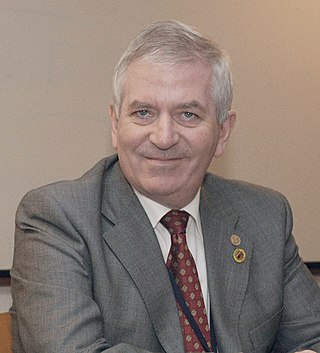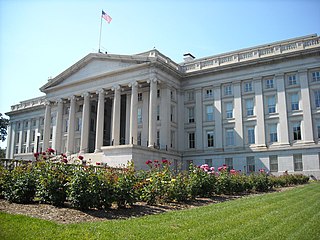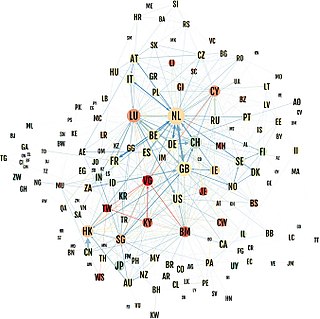Related Research Articles
Corporate haven, corporate tax haven, or multinational tax haven is used to describe a jurisdiction that multinational corporations find attractive for establishing subsidiaries or incorporation of regional or main company headquarters, mostly due to favourable tax regimes, and/or favourable secrecy laws, and/or favourable regulatory regimes.
A corporate tax, also called corporation tax or company tax, is a type of direct tax levied on the income or capital of corporations and other similar legal entities. The tax is usually imposed at the national level, but it may also be imposed at state or local levels in some countries. Corporate taxes may be referred to as income tax or capital tax, depending on the nature of the tax.

Ireland's Corporate Tax System is a central component of Ireland's economy. In 2016–17, foreign firms paid 80% of Irish corporate tax, employed 25% of the Irish labour force, and created 57% of Irish OECD non-farm value-add. As of 2017, 25 of the top 50 Irish firms were U.S.–controlled businesses, representing 70% of the revenue of the top 50 Irish firms. By 2018, Ireland had received the most U.S. § Corporate tax inversions in history, and Apple was over one–fifth of Irish GDP. Academics rank Ireland as the largest tax haven; larger than the Caribbean tax haven system.
International taxation is the study or determination of tax on a person or business subject to the tax laws of different countries, or the international aspects of an individual country's tax laws as the case may be. Governments usually limit the scope of their income taxation in some manner territorially or provide for offsets to taxation relating to extraterritorial income. The manner of limitation generally takes the form of a territorial, residence-based, or exclusionary system. Some governments have attempted to mitigate the differing limitations of each of these three broad systems by enacting a hybrid system with characteristics of two or more.
A tax haven is a term, often used pejoratively, to describe a place with very low tax rates for non-domiciled investors, even if the official rates may be higher.

A tax inversion or corporate tax inversion is a form of tax avoidance where a corporation restructures so that the current parent is replaced by a foreign parent, and the original parent company becomes a subsidiary of the foreign parent, thus moving its tax residence to the foreign country. Executives and operational headquarters can stay in the original country. The US definition requires that the original shareholders remain a majority control of the post-inverted company. In US federal legislation a company which has been restructured in this manner is referred to as an "inverted domestic corporation", and the term "corporate expatriate" is also used.

An offshore financial centre (OFC) is defined as a "country or jurisdiction that provides financial services to nonresidents on a scale that is incommensurate with the size and the financing of its domestic economy."

The Double Irish arrangement was a base erosion and profit shifting (BEPS) corporate tax avoidance tool used mainly by United States multinationals since the late 1980s to avoid corporate taxation on non-U.S. profits. It was the largest tax avoidance tool in history. By 2010, it was shielding US$100 billion annually in US multinational foreign profits from taxation, and was the main tool by which US multinationals built up untaxed offshore reserves of US$1 trillion from 2004 to 2018. Traditionally, it was also used with the Dutch Sandwich BEPS tool; however, 2010 changes to tax laws in Ireland dispensed with this requirement.
Formulary apportionment, also known as unitary taxation, is a method of splitting the total pre-tax profit earned by a multinational between the tax jurisdictions where it does business. It is an alternative to separate entity accounting, under which a branch or subsidiary within the jurisdiction is accounted for as a separate entity, requiring prices for transactions with other parts of the corporation or group to be assigned according to the arm's length standard commonly used in transfer pricing. In contrast, formulary apportionment attributes a portion of a multinational's total worldwide profit to each jurisdiction, based on factors such as the proportion of sales, assets or payroll in that jurisdiction.
A patent box is a special very low corporate tax regime used by several countries to incentivise research and development by taxing patent revenues differently from other commercial revenues. It is also known as intellectual property box regime, innovation box or IP box. Patent boxes have also been used as base erosion and profit shifting (BEPS) tools, to avoid corporate taxes.

Base erosion and profit shifting (BEPS) refers to corporate tax planning strategies used by multinationals to "shift" profits from higher-tax jurisdictions to lower-tax jurisdictions or no-tax locations where there is little or no economic activity, thus "eroding" the "tax-base" of the higher-tax jurisdictions using deductible payments such as interest or royalties. For the government, the tax base is a company's income or profit. Tax is levied as a percentage on this income/profit. When that income / profit is transferred to a tax haven, the tax base is eroded and the company does not pay taxes to the country that is generating the income. As a result, tax revenues are reduced and the country is disadvantaged. The Organisation for Economic Co-operation and Development (OECD) define BEPS strategies as "exploiting gaps and mismatches in tax rules". While some of the tactics are illegal, the majority are not. Because businesses that operate across borders can utilize BEPS to obtain a competitive edge over domestic businesses, it affects the righteousness and integrity of tax systems. Furthermore, it lessens deliberate compliance, when taxpayers notice multinationals legally avoiding corporate income taxes. Because developing nations rely more heavily on corporate income tax, they are disproportionately affected by BEPS.

Gabriel Zucman is a French economist who is currently an associate professor of public policy and economics at the University of California, Berkeley‘s Goldman School of Public Policy, Chaired Professor at the Paris School of Economics, and Director of the EU Tax Observatory.
The OECD G20 Base Erosion and Profit Shifting Project is an OECD/G20 project to set up an international framework to combat tax avoidance by multinational enterprises ("MNEs") using base erosion and profit shifting tools. The project, led by the OECD's Committee on Fiscal Affairs, began in 2013 with OECD and G20 countries, in a context of financial crisis and tax affairs. Currently, after the BEPS report has been delivered in 2015, the project is now in its implementation phase, 116 countries are involved including a majority of developing countries. During two years, the package was developed by participating members on an equal footing, as well as widespread consultations with jurisdictions and stakeholders, including business, academics and civil society. And since 2016, the OECD/G20 Inclusive Framework on BEPS provides for its 140 members a platform to work on an equal footing to tackle BEPS, including through peer review of the BEPS minimum standards, and monitoring of implementation of the BEPS package as a whole.

Conduit OFC and sink OFC is an empirical quantitative method of classifying corporate tax havens, offshore financial centres (OFCs) and tax havens.

Modified gross national income is a metric used by the Central Statistics Office (Ireland) to measure the Irish economy rather than GNI or GDP. GNI* is GNI minus the depreciation on Intellectual Property, depreciation on leased aircraft and the net factor income of redomiciled PLCs.

Ireland has been labelled as a tax haven or corporate tax haven in multiple financial reports, an allegation which the state has rejected in response. Ireland is on all academic "tax haven lists", including the § Leaders in tax haven research, and tax NGOs. Ireland does not meet the 1998 OECD definition of a tax haven, but no OECD member, including Switzerland, ever met this definition; only Trinidad & Tobago met it in 2017. Similarly, no EU–28 country is amongst the 64 listed in the 2017 EU tax haven blacklist and greylist. In September 2016, Brazil became the first G20 country to "blacklist" Ireland as a tax haven.
James R. Hines Jr. is an American economist and a founder of academic research into corporate-focused tax havens, and the effect of U.S. corporate tax policy on the behaviors of U.S. multinationals. His papers were some of the first to analyse profit shifting, and to establish quantitative features of tax havens. Hines showed that being a tax haven could be a prosperous strategy for a jurisdiction, and controversially, that tax havens can promote economic growth. Hines showed that use of tax havens by U.S. multinationals had maximized long-term U.S. exchequer tax receipts, at the expense of other jurisdictions. Hines is the most cited author on the research of tax havens, and his work on tax havens was relied upon by the CEA when drafting the Tax Cuts and Jobs Act of 2017.
Dhammika Dharmapala is an economist who is the Paul H. and Theo Leffman Professor of Law at the University of Chicago Law School. He is known for his research into corporate tax avoidance, corporate use of tax havens, and the corporate use of base erosion and profit shifting ("BEPS") techniques.
Kimberly Clausing is an American economist. She is the Eric M. Zolt Chair in Tax Law and Policy at the UCLA School of Law and a nonresident senior fellow at the Peterson Institute for International Economics. From 2021 to 2022, she was the deputy assistant secretary for tax analysis at the United States Department of the Treasury. Clausing is known for her work on international trade and tax policy, particularly the taxation of multinational corporations.

The global minimum corporate tax rate, or simply the global minimum tax, is a minimum rate of tax on corporate income internationally agreed upon and accepted by individual jurisdictions in the OECD/G20 Inclusive Framework. Each country would be eligible for a share of revenue generated by the tax. The aim is to reduce tax competition between countries and discourage multinational corporations (MNC) from profit shifting that avoids taxes.
References
- ↑ "Reuven Avi-Yonah | U-M LSA International Institute". ii.umich.edu.
- ↑ "Fellows Directory – American Bar Foundation". www.americanbarfoundation.org.
- ↑ "Revista de Administración Tributaria" (PDF).
- ↑ "Reuven S. Avi-Yonah".
- ↑ Institute, The American Law. "Members". American Law Institute.
- ↑ "Reuven Avi-Yonah". The American Prospect.
- ↑ "Reuven S. Avi-Yonah". DB.
- ↑ "Reuven Avi-Yonah". scholar.google.co.il.
- ↑ Singh, Rav (January 1, 2013). "Book review: Global Perspectives on Income Taxation Law. By Reuvan Avi-Yonah, Nicola Sartori and Omri Marian. Oxford, Oxford University Press, 2011. 288 pp. £41.99 (hardcover), £17.99 (paperback)". Cambridge International Law Journal. 2 (3): 661–665. doi: 10.7574/cjicl.02.03.121 – via www.elgaronline.com.
- ↑ Sjoquist, David L. (June 1, 2017). "TAXATION AND MIGRATION. Edited by REUVEN S. AVI-YONAH and JOEL SLEMROD". National Tax Journal. 70 (2): 495–503. doi:10.17310/ntj.2017.2.10 – via journals.uchicago.edu (Atypon).
- ↑ "Comparative fiscal federalism".
- ↑ "U.S. International Taxation: Cases and Materials". [self-published]
- ↑ Avi-Yonah, Reuven S. (2000). "Globalization, Tax Competition, and the Fiscal Crisis of the Welfare State". Harvard Law Review. 113 (7): 1573–1676. doi:10.2307/1342445. JSTOR 1342445 – via JSTOR.
- ↑ "The structure of international taxation : a proposal for simplification".
- ↑ Avi-Yonah, Reuven; Uhlmann, David (January 1, 2009). "Combating Global Climate Change: Why a Carbon Tax is a Better Response to Global Warming than Cap and Trade". Articles.
- ↑ Avi-Yonah, Reuven S. (December 7, 2005). "The Cyclical Transformations of the Corporate Form: A Historical Perspective on Corporate Social Responsibility". Delaware Journal of Corporate Law. 30: 767.
- ↑ Avi-Yonah, Reuven S. (August 22, 2021). "The International Tax Regime at 100: Reflections on the OECD's BEPS Project". SSRN 3908575 – via papers.ssrn.com.
- ↑ Avi-Yonah, Reuven S. (September 9, 2021). "Slicing the Shadow: A Proposal for Updating U.S. International Taxation". SSRN 3920267 – via papers.ssrn.com.
- ↑ "International Taxation of Electronic Commerce".
- ↑ "Allocating Business Profits for Tax Purposes: A Proposal to Adopt a Formulary Profit Split".
- ↑ Mason, Ruth (July 8, 2020). "The Transformation of International Tax". American Journal of International Law. 114 (3): 353–402. doi: 10.1017/ajil.2020.33 .
- ↑ Schoen, W. (2021). Is There Finally an International Tax System? In Kofler, Mason and Rust (eds)., Thinker, Teacher, Traveler: Reimagining International Tax, Essays in Honor of H. David Rosenbloom, 475
- ↑ "Avi-Yonah Receives 2023 Fulbright | University of Michigan Law School". michigan.law.umich.edu.